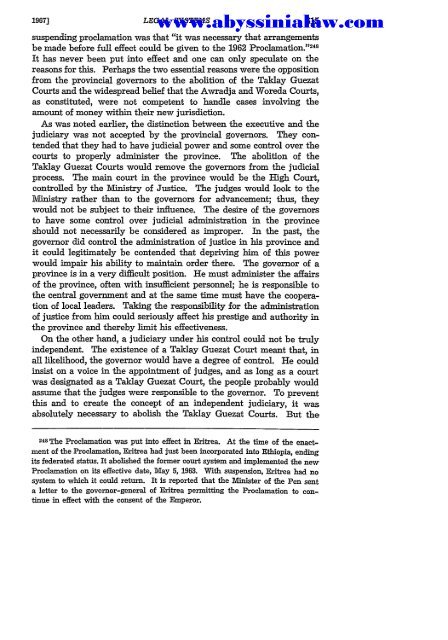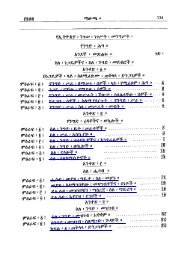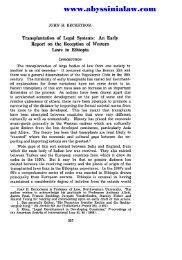Create successful ePaper yourself
Turn your PDF publications into a flip-book with our unique Google optimized e-Paper software.
LEGAL SYSTEMS<br />
suspending proclamation was that "it was necessary that arrangements<br />
be made before full effect could be given to the 1962 Proclamation. 24<br />
1967] www.abyssinialaw.com<br />
It has never been put into effect and one can only speculate on the<br />
reasons for this. Perhaps the two essential reasons were the opposition<br />
from the provincial governors to the abolition of the Talday Guezat<br />
Courts and the widespread belief that the Awradja and Woreda Courts,<br />
as constituted, were not competent to handle cases involving the<br />
amount of money within their new jurisdiction.<br />
As was noted earlier, the distinction between the executive and the<br />
judiciary was not accepted by the provincial governors. They contended<br />
that they had to have judicial power and some control over the<br />
courts to properly administer the province. The abolition of the<br />
Taklay Guezat Courts would remove the governors from the judicial<br />
process. The main court in the province would be the High Court,<br />
controlled by the Ministry of Justice. The judges would look to the<br />
iinistry rather than to the governors for advancement; thus, they<br />
would not be subject to their influence. The desire of the governors<br />
to have some control over judicial administration in the province<br />
should not necessarily be considered as improper. In the past, the<br />
governor did control the administration of justice in his province and<br />
it could legitimately be contended that depriving him of this power<br />
would impair his ability to maintain order there. The governor of a<br />
province is in a very difficult position. He must administer the affairs<br />
of the province, often with insufficient personnel; he is responsible to<br />
the central government and at the same time must have the cooperation<br />
of local leaders. Taking the responsibility for the administration<br />
of justice from him could seriously affect his prestige and authority in<br />
the province and thereby limit his effectiveness.<br />
On the other hand, a judiciary under his control could not be truly<br />
independent. The existence of a Taklay Guezat Court meant that, in<br />
all likelihood, the governor would have a degree of control. He could<br />
insist on a voice in the appointment of judges, and as long as a court<br />
was designated as a Taklay Guezat Court, the people probably would<br />
assume that the judges were responsible to the governor. To prevent<br />
this and to create the concept of an independent judiciary, it was<br />
absolutely necessary to abolish the Taklay Guezat Courts. But the<br />
248 The Proclamation was put into effect in Eritrea. At the time of the enactment<br />
of the Proclamation, Eritrea had just been incorporated into Ethiopia, ending<br />
its federated status. It abolished the former court system and implemented the new<br />
Proclamation on its effective date, May 5, 1963. With suspension, Eritrea had no<br />
system to which it could return. It is reported that the Minister of the Pen sent<br />
a letter to the governor-general of Eritrea permitting the Proclamation to continue<br />
in effect with the consent of the Emperor.





